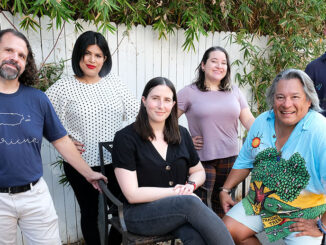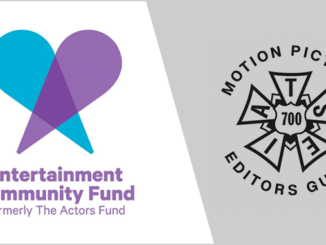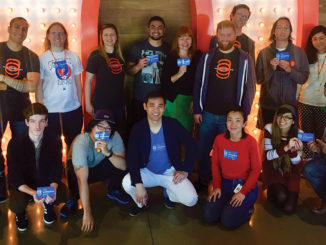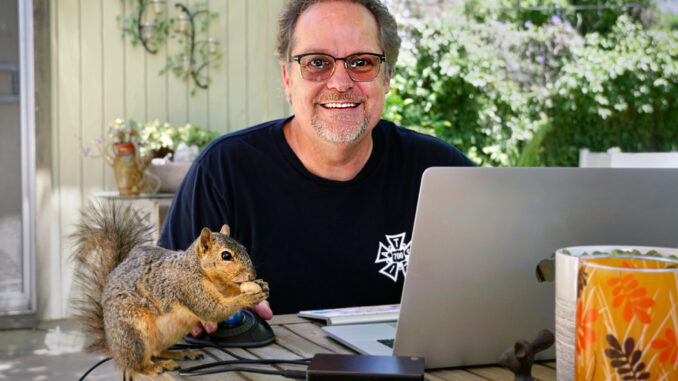
Career problems, financial hardship, even personal grief – members have seen it all during recent stresses. Here’s how they have kept going.
By Michael Goldman
As the COVID-19 pandemic descended, entertainment professionals faced massive uncertainty regarding, among other things, what they should or should not be doing to make sure that the show, quite literally, could still go on. In a world of lockdowns and social unrest, home entertainment helped keep people rooted during a time of fear and uncertainty. So the post-production industry needed to figure out a way to navigate this new landscape-currently a huge area of focus for the editorial community.
“All the trade articles I’ve read about post-pandemic protocol have mainly discussed production,” said picture editor Shannon Davis. “But we have to make sure post is always in the conversation.”
Music editor Jillinda Palmer concurs, and not only for the industry’s and the public’s sake-but for her own sanity, as well.
“The pandemic made me wonder if I have other useful skills in life to contribute more,” Palmer said. “But my mom reminded me that entertainment is important, and we need to laugh sometimes, or we’ll all go insane.”
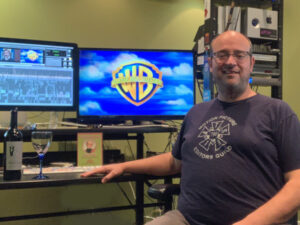
For people like picture editor A.J. Catoline, an MPEG board member, the scramble in March to figure out a remote workflow to continue cutting the upcoming Apple TV+ comedy “Ted Lasso” became a crucial endeavor as the madness hit.
“My boss sent out our post-coordinator that very day with a credit card and told him to buy every hard drive he could find,” Catoline recalled. “We downloaded 10 episodes of media onto four encrypted terabyte drives. Then he said he would pay our editorial team for the weekend to go home and get our home Avids up and running.”
For working editors, questions abounded about things like logistics, expenses, kit rentals, use of personal equipment, workday structure, and more. Guild members used to studio evironments were forced to grapple with residential broadband speeds as they attempted to run sessions from home using Zoom or Evercast streaming software. Sound editors reported it required a full day to upload finished mix files. An industry that spent decades perfecting digital post-production infrastructures suddenly found itself riding home Internet connections already clogged by a nation of streaming content watchers.
“When I was on the dub stage, I walked in and started mixing,” said Frank Morrone, MPSE, CAS and MPEG board member. “Technicians worked on all the file management. Now, I’m putting in a lot more hours, because you are focused on uploading and downloading.”
Fortunately, in his case, Catoline already had a home editing system set up, but he still grabbed his ergonomic work chair from his office on his way into quarantine. And he wasn’t the only one.
“I was prepared to explain to security I was borrowing the chair,” Catoline recalled. “I didn’t have to. I was shocked to see the entire lot with many crewmembers doing the same-jamming speakers, keyboards, monitors into their cars. One sound editor was loading an entire Pro Tools system into the back of his truck. Studio security was watching it happen. The studio understood we had to get the job done quickly.”
And yet, despite the frenzy, Catoline and other working editors were the lucky ones-for now, they still had work. Many in the editorial community, by contrast, suddenly had no work at all. Erik C. Andersen, also a picture editor and MPEG board member, was among them.
“Pilot season was starting, so I was sending out emails for potential work,” Andersen says. “Everything suddenly shut down. I decided it was insensitive to continue soliciting work, so I stopped. I eventually realized there was a freedom in not looking for work so I decided to divert my energy into something else. Since then, I’ve been helping the Guild work on some of the issues facing editors, and started volunteering my time to worthy projects, including IATSE’s ‘Buddy-Up,’ designed to help retired members.
“I tell members not to be embarrassed,” he adds. “There is nothing they’ve done to cause the problem they’re facing. Take advantage of support systems. After all, our Guild is a community first and foremost, so we need to reach out to each other and do our best to keep our 8,000-plus members connected during this time.”
“Members should remember the expectation is not to turn our homes into an office,” Catoline adds. “We are just doing our best to keep going during this crisis. Normally, we work together on the job site as a crew, and suddenly we found ourselves working apart. This runs counter to the logic of a union. And the principles of the union still stand strong-we support each other as a team.”
With that in mind, CineMontage reached out to a group of Guild members, representing various job classifications, to find out how they were coping with this sudden shift in their work and personal lives. Following is a sampling of their responses.
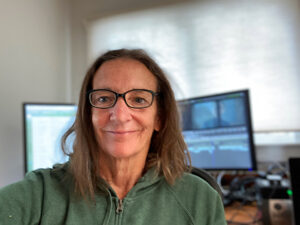 Dorian Harris, ACE (Picture Editor)
Dorian Harris, ACE (Picture Editor)
What was your professional situation when you realized a shutdown was coming?
We were about to finish shooting “Hit and Run” for Netflix when they shut down on March 11. By Sunday, [California Gov.] Newsom issued the stay at home for 65-and-older, which included me, so I did not go to work.
Describe your personal and professional quarantine situation:
Moviola set up my work Avid at home. I work from home with a drive of my episodes only, while my assistant and I communicate and share media all day. I am quarantining alone at home, although I frequently see my daughters. I am set up to work in my daughter’s bedroom, in fact. Being on the boards of the Guild and American Cinema Editors, I have been doing many Zoom calls, including with heads of all the Women’s Steering Committees for District 2 Locals and the Alliance of Women Editors.
Beyond work, how have you been trying to make a difference during this difficult time?
I have participated in three food banks, including one for IATSE, and sewed 40 masks for the Costume Designers Guild PPE Drive. It’s important to realize the impact that COVID-19 has had on the LA community and the already food-insecure population.
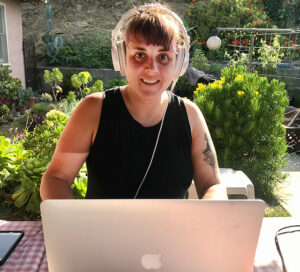 Jillinda Palmer (Music Editor)
Jillinda Palmer (Music Editor)
What was your professional situation when you realized a shutdown was coming?
I was working on a TV series for Disney+, for which we were already having meetings remotely via FaceTime, and I was uploading files remotely. For a feature project for Paramount Pictures, we were scrambling to get our second cut out for a screening when everything started to shut down. Then, that week, everyone on the post crew moved home to work remotely, and they shut down the Paramount lot.
What’s your personal quarantine situation been like?
I live at home with my husband and rescued pets-two cats, a newly adopted kitten, and a tortoise, who are all entertaining and good therapy. My cats have provided me with so much joy throughout the pandemic. However, I have been a little worried about them during this tumultuous time. At the moment, my cats all seem to be off their food. I think the stress of us being at home more than ever is rubbing off on them. I was actually talking to a friend of mine about this and she told me that she has been giving her cats special feline supplements to boost their health during the pandemic. I know there are some great pet health supplement brands out there like Ultimate Pet Nutrition nowadays and apparently, you can get a Nutra Thrive for Cats deal if you shop online, so I think I am going to invest in some supplements for my cats and see how they get on. Of course, if things get any worse I will probably speak to my vet, but I think a supplement should help to settle them all down. Speaking of which, feel free to get in touch if you have any cat health tips to share as I would love to hear them!
The toughest part has been:
Seeing friends and their loved ones die alone. I feel helpless, and I can’t even give anyone a hug or go to a funeral for friends who have died.
What advice to you have for coping with stress during this period?
It is not just my cats that have been feeling the pressures during the pandemic. I feel that proper mental health maintenance is crucial, especially in these times. Mental-health maintenance should not be considered a luxury-it’s a necessity [and] should be easily accessible to us. Work from home hours tends to get overboard sometimes. But people should try to find time for relaxing. Get some time off the screen, try some CBD Oil UK: https://blessedcbd.co.uk or dispensaries similar to Blessed CBD for experiencing a relaxing CBD bath. Caring for one’s physical and mental health is the need of the hour in these troubled times.
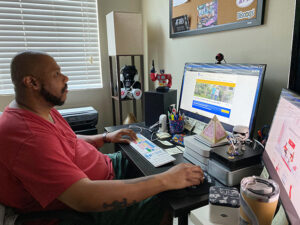 Sean Linal Peterkin (Assistant Editor)
Sean Linal Peterkin (Assistant Editor)
What was your professional situation when you realized a shutdown was coming?
I ended my job on the Fox/Showtime drama, “The Chi,” in late January. About a week or so before the stay-at-home order went into effect, I landed a new assistant editor union gig, which would have started late March. Instead, it’s been pushed back until further notice.
How has the quarantine affected you personally?
I am a very social person. I do not have any family or friends I grew up with here in Los Angeles. So going for weeks without close human contact could have put me in a major state of depression. Luckily, my girlfriend moved in with me a couple of months before the pandemic hit. So I’m truly blessed and thankful to have her, especially during these trying times.
Have you utilized any financial assistance programs?
I was already receiving unemployment insurance since January. Unemployment insurance maxes out at $450 a week, so I had to pull from my savings to help cover rent, utilities, food, gas, car note, student loans, and credit cards, even before the pandemic. When I needed to renew my car insurance, I was looking at tens of progressive insurance reviews and comparisons because I needed to find the cheapest policy as that was the only one I could afford. I wasn’t the only one in this situation either. Now, additional aid is starting to come through because I reached out to Cal Fresh, MPI, and The Actors Fund. The application process wasn’t difficult, although it did take me some time to scan and send them personal information. I recently received grants from Cal Fresh, MPI and The Actors Fund, which has been a tremendous blessing. I encourage all who need the help to apply. I found all the information on MPEG’s website.
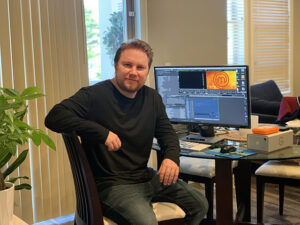 Sean McGah (Assistant Editor)
Sean McGah (Assistant Editor)
How have you managed workflow for editing unscripted television remotely?
We were half-way through filming, and just ramping up to start post production on season 11 of Fox’s “MasterChef” when the quarantine started shutting down the town. Endemol was able to pivot and find a way to have all editors pick up a Macbook Pro and Avid system. They even managed to get some of the returning editors the same system they had worked on last season, so all their settings were still there. They provided each editor with a 6-terabyte drive with footage, music, and graphics, and a 2-terabyte drive for rendering. We used a folder structure on Box.com that mirrors our projects, so when we share bins, we upload them to the same folders on Box as we would in our projects. Using apps like Zoom, we have been able to share bins, upload cuts, get notes, communicate with our teammates, and even host a weekly cocktail party so that we can keep the camaraderie going. This new workflow has definitely added to the amount of work that the assistant editors are responsible for, but we are up to the challenge!
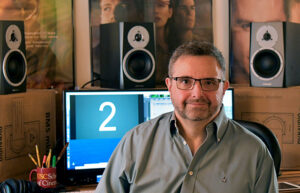 F. Hudson Miller (Sound Editor/MPEG Vice President)
F. Hudson Miller (Sound Editor/MPEG Vice President)
What was your professional situation when you realized a shutdown was coming?
On March 20, I was informed that Warner Bros. would be shutting down indefinitely and I was asked to take over sound effects editorial work for (the CBS show) “All Rise” from my home. I had just upgraded my computer to a 64-bit Mac Mini, thus making my home ProTools completely obsolete. However, over the next five hours, I downloaded a new version of ProTools Ultimate, ordered a new 64-bit audio interface, and was cutting by 8 am Saturday morning. It was a hectic evening, but after 30 years in Hollywood post, you learn how to line up the ducks in a big fat hurry.
How do you think the Guild should reach out to members during this difficult time?
Since it’s unclear how long this situation is going to last, the Guild and the IA need to be proactive in establishing safe work standards as we begin to return to work. A great many members have jobs that can be done from home. It is reasonable to expect that those who are able to work from home should continue to do so until the virus is no longer a serious threat. While some classifications can be more difficult to adapt to the work-at-home model, a great many of us-with creativity, flexibility, and technology-never missed a beat in the transition to home studios and offices. Additionally, we must ensure that those who work at home are appropriately compensated for the large equipment and library investments they have made for the benefit of employers. We must also seriously consider that younger and less established members may be at a significant disadvantage in the work-at-home scheme-it can be a financial hurdle for those who don’t have resources.
 Rick Owens (Foley Artist)
Rick Owens (Foley Artist)
What was your professional situation when you realized a shutdown was coming?
I was in the middle of two projects when the stay-at-home order came down. On “NCIS Los Angeles” (CBS), we still had three episodes in the pipeline. Our supervisor gave us the option to complete the episodes, or if we felt unsafe, we could opt out. As a crew, we discussed it and agreed that we would take the necessary precautions to ensure a clean and safe working environment. We kept our social distance as much as we could, wore masks, and sanitized everything. I was also in the middle of a feature animation project at Sony. The studio made the decision on our behalf, and informed us they were going to shut the lot down. Though we only had five days left to complete the project, the studio made it an easy choice-it will be good to be back on the show when the time is right.
What has your personal and professional quarantine situation been like?
I am quarantining with my wife and our nine-year-old daughter. My wife is a social worker. For the first three or four weeks, she was still going in full time, and then her hours were reduced. My daughter has been at home since mid-March. We have developed a routine that seems to be working. I am not able to work from home. Foley is a craft that has to be done on the stage. Unlike editorial, I can’t take my work with me and complete it on a home system.
I’ve kept my sanity by:
Staying in touch with my friends and colleagues. I try to focus on gratitude for having a family that I get to be a part of and for having a career that satisfies my creative mind.
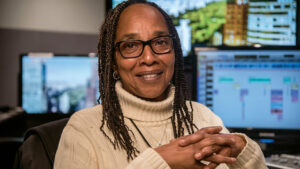
Jesse Dodd (ADR and Foley Re-recording Mixer)
What was your professional situation when you realized a shutdown was coming?
I was in the middle of group ADR sessions for several shows that particular week-I have been working on “Chicago Fire,” “Chicago Med,” “Chicago PD,” and “Good Girls” recently. It was very disruptive on several levels, especially considering that this specific part of our medium needs to be done in a group setting of six to 12 or more people in a single room. It proved to be quite a task-lots of masks, hand sanitizer, creative social distancing, Lysol, and feeble attempts at mental calming. Eventually, we were deferred from the lot by state and company mandate until further notice. The remainder of the ADR that was done after that to finish up the last of the shows was done using creative modes and prayers for success. Although some dubbing re-recording mixers have been able to work from home to complete shows, as an ADR/Foley mixer, I could not. Even though I have a rig at home, I cannot provide the controlled environment needed.
What has your personal quarantine situation been like?
I have been spending time with my immediate family. I have taken time to catch up on some reading, and binge-watch several shows. I have also volunteered to deliver meals and shop for those at high risk who are unable to leave their homes.
The toughest part has been:
Not being able to work-I love what I do and miss my artistic outlet.
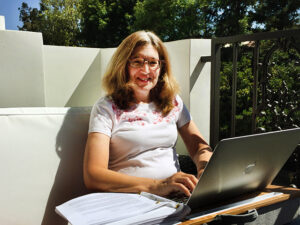 Holly Sklar (Story Analyst)
Holly Sklar (Story Analyst)
What was your professional situation when you realized a shutdown was coming?
I’m lucky I was already working from home for Warner Bros. Pictures, except for on-the-lot monthly staff meetings, and occasional visits. I was already set up, although before the quarantine, I would get basic office supplies from our department on the lot in order to print out many a screenplay.
What has your personal and professional quarantine situation been like?
I am quarantining with my husband, our ninth-grade twins, and our adopted rescue cat, whose presence helps us all. Get a rescue pet if you can! My kids have Zoom school 9 am to 2 pm Monday to Friday and some Zoom extracurricular activities on the weekends, plus homework. But when school hours and homework are done, I’m often still working, as is my husband. That’s the biggest challenge, but we are together more of the day, we don’t have to get them to and from school, and there’s more family time, in general. My department’s staff meetings are held on Zoom, and some of my colleagues and I have gotten together for half-hour virtual lunchtime friendly catchups. But Zoom isn’t the same as giving a hug.
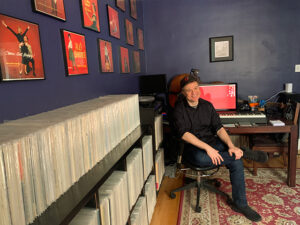 Ethan Stoller (Music Editor)
Ethan Stoller (Music Editor)
What was your professional situation when you realized a shutdown was coming?
I was on hiatus between seasons of Showtime’s “Work in Progress,” working out of Kinowerks, Chicago. I was composing the score for an independent short film, but otherwise not employed.
What has your personal and professional quarantine situation been like?
I’m at home in the condo I share with my wife in Chicago. She is a professor in a grad school program, so she is still working full-time from home, harder than ever. I’ve assembled my workstation in my home office, but honestly I haven’t been doing much in the way of work. I’ve been passing time by updating, organizing, cataloguing, and photographing my large record collection.
Are you set up to be able to routinely work from home for however long is necessary?
I have done composing gigs from home many times. I think the transition to music editing from home will be pretty easy, if a bit dreary. The main difficulty and difference will be how to listen to mixes on the dub stage. Editorially, it could be done without a noticeable loss of efficacy. The re-recording mixer(s) will not get feedback from me on how the mixes sound, though, because I can’t simulate the ideal listening environment. The hardest part will be missing the camaraderie.
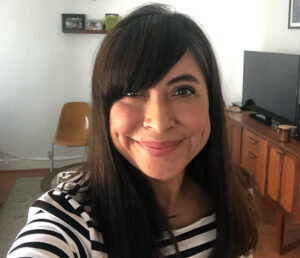 Myra Lopez (Animation Editor)
Myra Lopez (Animation Editor)
What was your professional situation when you realized a shutdown was coming?
I was wrapping up a normal workday (as lead editor on Netflix’s “Maya and the Three”) when the studio announced it would shut down temporarily as news of the pandemic spread. I went home and awaited instructions on what would happen next. Then the state announced everyone would shelter-in-place. Shortly after that announcement, we were told the studio was working on getting us set up to work from home. It took about a week and half to get set up. I live in a bungalow and have now converted my breakfast nook into my office.
What has your personal and professional quarantine situation been like?
I’m quarantining alone. I am trying to keep a normal schedule so that I don’t suffer when I do have to physically go back into the office. I usually wake up early, make coffee, check email and work on episodes. When I need a break, I go outside and work on my backyard.
The toughest part has been:
It has been very difficult to be away from family. I have a family member with a weak immune system. Caring for them and getting them treatment for their condition has been challenging during this time. I also have a sister who works at an emergency room and an urgent care that I worry about.
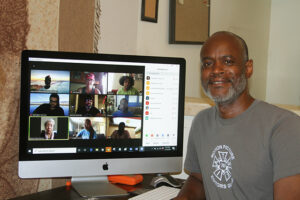 Leander Sales (Picture Editor)
Leander Sales (Picture Editor)
What was your professional situation when you realized a shutdown was coming?
I was preparing to teach an editing class at UCLA when the pandemic started. I had to get familiar with Zoom. I do miss teaching in the classroom, but Zoom will do for now.
Are you set up to be able to work from home?
I’m able to work from home when I’m editing, but currently I’m teaching so I’m not required to use a lot of editing equipment. I’ll be teaching until the end of June-then I’ll see how difficult things will be with unemployment insurance.
What has your personal quarantine situation been like?
I’m quarantined with my two teenage sons. They’re doing their classes on Zoom. We cook a lot and talk more. After finishing their schoolwork we all watch TV and Netflix, sometimes together and sometimes separately. We’ve also gotten their grandmother to use WhatsApp video chat. I have relatives and friends who work in hospitals, and I pray for them every day.
Any suggestions you would share with other members?
We should be compensated for using our own equipment and the electricity it takes to run the equipment. I’m also very curious to see what the isolation does to us as a society. Personally, coronavirus has given me a greater appreciation for all the things I took for granted, starting with life, trusting other people, the air I breathe, the things I touch.
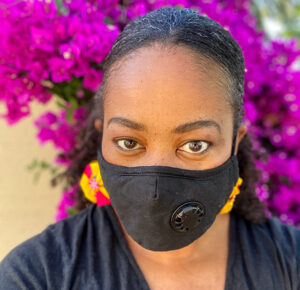 Shannon Davis, ACE (Picture Editor)
Shannon Davis, ACE (Picture Editor)
What was your professional situation when you realized a shutdown was coming?
I had just finished the Netflix show “#BlackAF.” I was taking meetings and considering my next project.
What has your personal quarantine situation been like?
I live with my husband and our two kids. My husband works from home. I’m helping my five-year-old daughter with her kindergarten homeschool work, while chasing my very active toddler around the house. I have the occasional video chat with friends and family, which keeps me going. I’m binge-watching everything I didn’t have time to watch before, but I can only do that between the kids’ bedtime and about 2 am when I have to forgo my “me time” for some sleep time.
Have you investigated any financial assistance programs?
I received an SBA Small Business Paycheck Protection Program Loan, so I’m able to pay myself a reduced salary. But I’m anxious, because that program is not indefinite. I’ll need to get back to work soon.
The toughest part has been:
Being home day in and day out. I’m pretty social and like to be out and about, and I miss work, too, because I miss using my creative/analytical side.
I’ve kept my sanity by:
Can’t say that I’ve kept it. Won’t know until we’re on the other side of this.
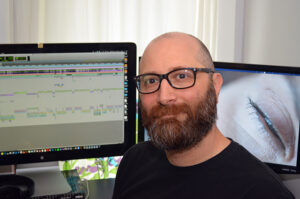 Craig LoGiudice (Assistant Sound Editor)
Craig LoGiudice (Assistant Sound Editor)
What was your professional situation when you realized a shutdown was coming?
We were in the middle of the “Not Too Late Show with Elmo” for HBO, and just about to get started on (Hulu’s) “Ramy.”
What has your personal quarantine situation been like?
Pretty low-key. I’m at home with my wife, two dogs, and two cats. We’re both working from home at the moment. We’ve tried to keep our routines about the same as if we were still commuting into Manhattan to our offices. Up before 7 am, start work at about 8:30, an hour for lunch and walking the dogs, work until about 5:30 to 6:00, rinse and repeat.
The toughest part of this quarantine situation for me has been:
Boredom, repetition, lack of social interaction, keeping my cats off the keyboard.
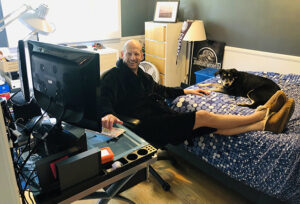 J.P. Bernardo (Picture Editor)
J.P. Bernardo (Picture Editor)
What do you miss from the days at the office?
I miss the social interactions with my co-workers and the creative exchanges while sitting with the directors and producers, but, I have to admit the dress code is all that and a bag a chips. In fact, if I spill these chips on my robe while I work, nobody will ever know. Seriously though, just glad to be able to continue to work, create, and bring a great show to the masses who could use a laugh right now.
 Daniel Williams (Assistant Editor, “Them: Covenant,” Amazon limited series)
Daniel Williams (Assistant Editor, “Them: Covenant,” Amazon limited series)
Did you get any new gear for working at home?
I have been wanting to get a new desk for awhile now, working from home pushed me to finally order this standing desk. The workflow as an Assistant Editor has been a bit more difficult. In particular I don’t have great speakers at home so managing sound levels has been more difficult. Home/Work boundaries has been consistently difficult, in particular knowing when to “leave the office.” It feels more arbitrary to say I am starting or ending my day when everything is still a few feet away. My Editor and I have tried to keep within normal work hours and we are just being flexible knowing this is new experience for everyone.
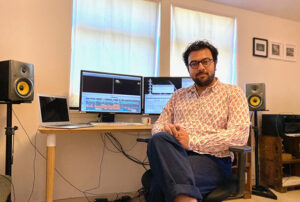 Shayar Bhansali (Picture Editor, “I’m Your Woman,” Amazon feature film)
Shayar Bhansali (Picture Editor, “I’m Your Woman,” Amazon feature film)
How have you been holding up in pandemic?
Along with editor Tracey Wadmore Smith, we moved stripped down versions of our editorial setups from our offices to our homes. Editing remotely has allowed us to spend more time with our families since we aren’t commuting to the office, but it has made our workflow less fluid since we end up spending a lot of time waiting on uploads and feedback. We miss the interaction and collaboration with the director and the editorial team, but we were lucky to be pretty far along the editing process when we had to shut our offices down. Creating boundaries between the office and home have been challenging but we’re definitely better at stopping for lunch and breaks than we were in the cutting room!
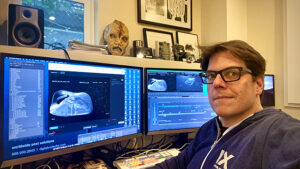 Tom Costantino (Picture Editor, “The Orville”)
Tom Costantino (Picture Editor, “The Orville”)
What do you love about working from home?
In no particular order: Using my commute time to get actual work done. Being able to read a book to the kids and put them to sleep not over FaceTime. Wearing the exact same outfit (sweats/hoodie) to Dr. Brundlefly levels almost every day.
What don’t you like?
I’ve spent years learning how not to be a house bound introvert. This is not helping.
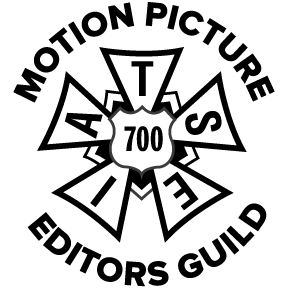 MPEG CORONAVIRUS UPDATES
MPEG CORONAVIRUS UPDATES
Information
FAQs
Mental Health Resources
Volunteer/Donation Opportunities



